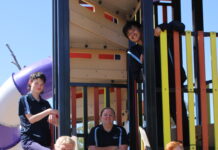Kylie Davis, Captain of the Country Fire Authority, Eaglehawk Fire Brigade, has sent us some information about preparing your yard before the fire season starts.
Victoria is one of the most fire-prone areas in the world.
Understanding your level of risk is the first step in knowing what to do before and during a fire.
By recognising and understanding your risk environment this will
also help you to start preparing your property for fire and know what to do.
Do you live close to or among grass or paddocks?
Grassfires can be extremely dangerous – people can die in grassfires.
WHAT CAN YOU EXPECT?
Dry and brown grass that easily catches fire.
Grass more than 10cm tall will have a higher flame height and intensity.
Faster burning than through forests as grass is a finer fuel.
Radiant heat (the heat created by a fire)
Fires that can start early in the day.
Faster moving fires that travel up to 25 km per hour.
WHAT TO DO:
Prepare your property for fire before summer starts. Create fuel breaks around your property and the assets that you want to protect – you will need to maintain these throughout summer.
The safest place to be is away from the threat. If you’re caught in a grassfire move to somewhere with minimal vegetation, such as a ploughed or well-grazed paddock. If you’re caught in a car, don’t get out and run.
Turn your hazard lights on and park off the roadway away from dense bush and long grass facing towards the oncoming fire.
Before the fire approaches tightly close windows and doors, shut all
vents and turn off the engine and make sure you get down below
window level and cover up with woollen blankets.
Sheltering in a car is extremely dangerous and can result in serious injury or death. Always plan to leave early to avoid this situation.
Stay informed on hot, dry, windy days by monitoring conditions outside and tuning into a local emergency roadcaster, checking emergency.vic.gov.au regularly and by downloading the VicEmergency app.
How to prepare your property:
Remove Flammables
Remove flammable items from decks and verandahs such as boxes, furniture and doormats.
Keep grass short
Keep grass cut to less than 10cm. Fire can ignite and travel quickly through long grass.
Woodpiles
Keep woodpiles away from the house. Stray fire embers can easily ignite woodpiles.
Store Flammables
Store flammable liquids away from house. Where possible store in flame proof containers.
Leaves and Twigs
Get rid of dry grass, leaves, twigs and loose bark.
Prune shrubs
Prune lower branches of shrubs to separate from surface fuels underneath.
Prune shrubs well away from branches of mature trees
Cut back overhanging tree branches close to property – no branches in 10m space.
Garden beds
Do not have large shrubs next to or under windows.
Pebbles and rocks
Use pebbles and rocks in your garden (not flammable mulch).
Roof gutters
Keep gutters and roof areas clear of leaf litter.




























